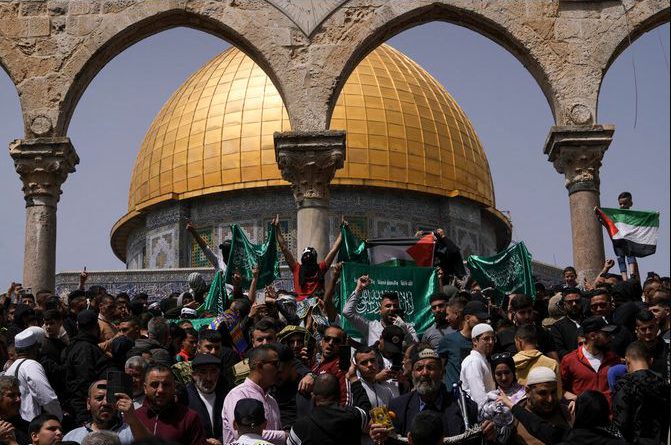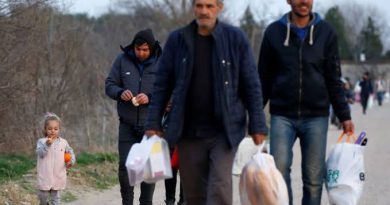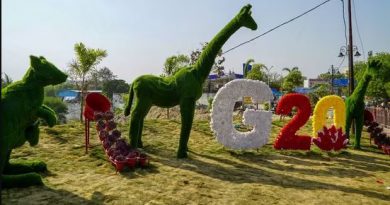Israeli restrictions at Al-Aqsa Mosque reduced Friday prayers’ attendance by HALF
Ramallah – Al-Aqsa mosque in Jerusalem hosted Friday prayers amidst stringent Israeli security measures and police roadblocks that constrained the number of worshippers able to enter the shrine.
Two Israeli ladies were shot dead when their automobile was ambushed in the occupied West Bank, and tensions remained high and violence persisted.
On the third Friday of Ramadan, 130,000 pilgrims conducted prayers at Al-Aqsa, which is half as many as the previous year, according to the Islamic Awqaf Department in Jerusalem. More than 2,300 soldiers were stationed at the Al-Aqsa and Old City gates by Israeli forces, blocking the mosque’s main entrance and prohibiting men under the age of 55 from entering Jerusalem and getting there.
The phrase “Do not test our patience; Al-Aqsa is a red line” was displayed during a demonstration that followed Friday prayer.
Israeli police attacked dozens of worshippers trying to enter the mosque through the Bab Hatta Gate for Fajr prayer at daybreak, which sparked clashes. They also attacked local traders and owners of stalls.
According to Sheikh Talib Al-Silwadi, one of Ramallah’s most well-known clerics, the mosque has enormous religious significance for Muslims as it is seen as the entrance to paradise. He has urged Palestinians to pray at Al-Aqsa throughout Ramadan.
We must protect it with all of our might, he stated, in light of the difficulties facing Israel. “Praying there during Ramadan is the least we can do for Al-Aqsa, which faces the threat of becoming more Jewish.”
Earlier, after midnight, Israeli police detained several young men from Silwan’s Al-Thawri neighbourhood after a settler in the nearby town of Al-Tur fired at them. Al-Makassed Hospital in Al-Tur was also raided by police, who claimed to be looking for injured persons.
The mother of the two Israeli women who were murdered and critically injured when their car came under fire in the Jewish village of Hamra in the occupied West Bank were sisters, according to local media reports. Gaza’s ruling Hamas militant faction applauded the shooting but made no claims of responsibility.
Benjamin Netanyahu, the Israeli prime minister, announced that he has requested a security evaluation of the circumstance. After the attack, the Israeli army established military checkpoints, placed Jericho and the Jordan Valley under lockdown, and began a thorough search of Palestinian cars. In the mountains and valleys, other soldiers were seen conducting searches. Additionally, security measures at military checkpoints encircling Nablus were tightened by Israeli army soldiers.
The commander of the Israel Defense Forces, Col. Hertzi Halevi, assessed the Hamra attack as severe. According to Hamas and the Islamic Jihad, the attack on Muslim prayers at the mosque during Ramadan was an act of vengeance for ongoing Israeli abuses at Al-Aqsa and a warning to Israeli authorities.
Israeli police head Yaakov Shabtai advised licenced gun owners and skilled users among the settlers to carry their firearms in support of the armed forces in the event of aggression from the Palestinians.
According to Esmat Mansour, a Palestinian authority on Israeli affairs, the Hamra incident was just as deadly in terms of its potential consequences as rockets fired at Israel from Lebanon and Gaza.
“It could further complicate the security scene and change the security environment in the West Bank,” he said.
In Taqu, southeast of Bethlehem, Israeli settlers stoned Palestinian automobiles, breaking several of them. They carried out the similar action close to Ramallah’s northern entrance. Additionally, Israelis attacked Palestinian properties in Khirbet Humsa Al-Tahta in the northern Jordan Valley while being protected by substantial numbers of Israeli army soldiers.
During the early hours of Friday, hardline settlers from “price tag” terrorist gangs damaged property with racist and anti-Arab graffiti and set ablaze vehicles belonging to inhabitants of Israel’s Arab city of Kafr Qassem. Racist crimes have been committed by these groups in numerous Palestinian villages. Sacred sites, mosques, churches, and cemeteries for Muslims and Christians are also targeted.



